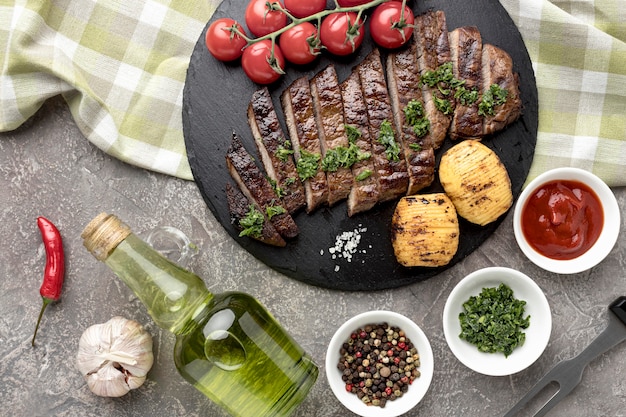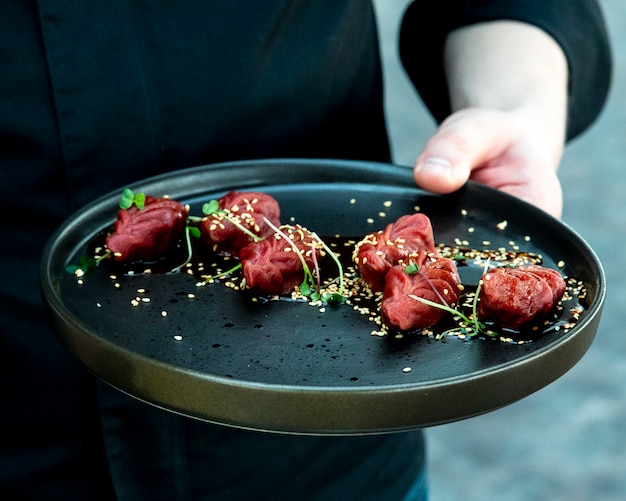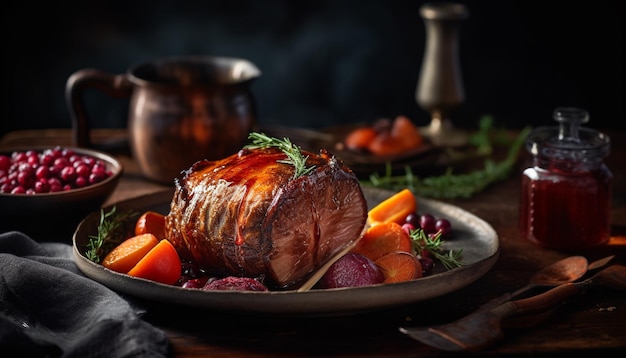(Part 1) The Allure of Filet Mignon

The Crown Jewel of Steaks
Filet Mignon is the undisputed champion of the steak world. It's the cut that makes everyone sit up and take notice. But what exactly makes it so special? Let's break it down.Firstly, Filet Mignon comes from the tenderloin, the most tender muscle in the entire cow. It's located along the backbone, nestled between the ribs and the hip. This muscle is barely used, which explains its melt-in-your-mouth texture.
A Symphony of Flavor and Texture
The taste of Filet Mignon is delicate and subtly sweet, with a richness that comes from the marbling – those little streaks of fat that run through the meat. And because it's a lean cut, Filet Mignon boasts a clean, almost buttery flavor. It's a steak that's both elegant and satisfying.A Rich History
Filet Mignon's story goes way back. The Romans, known for their appreciation of fine dining, treasured tender cuts of meat. Filet Mignon, with its delicate texture, was considered a true delicacy. It wasn't until the 19th century, however, that it truly gained global fame. French chefs embraced it, transforming it into a culinary icon often served with rich sauces and sophisticated garnishes.(Part 2) Choosing Your Weapon: Picking the perfect filet mignon

Finding the Right Cut: It's All About Marbling
Forget grabbing the first Filet Mignon you see. Picking the right cut is a crucial step to achieving steak perfection. The key is marbling – those creamy white streaks of fat that run through the meat. They're like little flavor bombs, adding richness, juiciness, and that unparalleled tenderness that makes Filet Mignon so special. Look for a cut with a good amount of marbling throughout.The Grade Game: Choice or Prime, That's the Prime
The USDA grading system is your guide to Filet Mignon quality. It's based on the amount of marbling in the meat, and the higher the grade, the more marbling you'll find. Here's a quick rundown:- Select: The lowest grade, with the least marbling. Not ideal for Filet Mignon.
- Choice: A good quality grade with moderate marbling. A solid choice for Filet Mignon.
- Prime: The highest grade, boasting the most marbling. The gold standard for a truly indulgent Filet Mignon experience.
For maximum flavor and tenderness, aim for a Choice or Prime grade Filet Mignon. Trust me, your taste buds will thank you.
Size Matters: The Perfect Portion
Consider how many people you're feeding. A standard Filet Mignon is typically 6-8 ounces. But for a truly decadent experience, go for a larger cut – 10-12 ounces or even more. A good rule of thumb is 1 inch of thickness per ounce of meat.Thickness is King: The Secret to Even Cooking
A thick Filet Mignon (at least 1 inch, ideally 1.5 inches) cooks more evenly. This means a juicy, tender steak from edge to edge.Freshness Check: The Signs of a Great Steak
Freshness is key. Look for a vibrant red color, a firm texture, and no discoloration or off-putting smells. If you're buying from a butcher, don't hesitate to ask about the source and age of the meat.(Part 3) The Art of Seasoning: Less is More, But More is Better

Simplicity Reigns: Salt and Pepper, the Classic Duo
Filet Mignon is a steak that loves to be simple. You can achieve incredible results with just salt and pepper, letting the natural flavor of the meat shine. But keep in mind, it's not about quantity, it's about quality. Use freshly ground black pepper, not the pre-ground stuff.Salt: The Flavor Enhancer
Salt is the unsung hero of steak cooking. It draws moisture out of the meat, helping to develop flavor and create a crisp, delicious crust. Season your Filet Mignon liberally with salt at least 30 minutes before cooking – the longer the better.Pepper: A Touch of Spice
Freshly ground black pepper adds a delightful kick, complementing the richness of the meat. You can also experiment with other peppercorns like pink peppercorns or green peppercorns for a subtle burst of flavor.Beyond the Basics: Adding Extra Depth
If you're feeling adventurous, feel free to add some herbs and spices. A pinch of garlic powder, paprika, or a sprinkle of dried rosemary can add a touch of complexity. But remember, less is more!The Great Marinating Debate: To Marinate or Not to Marinate
Marinades can infuse your Filet Mignon with extra flavor, but some believe they can toughen the meat. If you choose to marinate, opt for a simple blend of olive oil, lemon juice, and herbs. Keep the marinating time short, no more than 30 minutes. The goal is to add flavor, not to soak the steak.(Part 4) cooking filet mignon to Perfection: The Ultimate Guide
Choosing Your Weapon of Choice: The Cooking Method
Now we're getting to the heart of the matter. There are many ways to cook filet mignon, each with its own distinct character.- Pan-Searing: This is a classic method for quick and easy results. Heat a heavy-bottomed pan over high heat. Add a tablespoon of oil and sear the steak for 2-3 minutes per side. This creates a delicious, crispy crust while keeping the inside tender.
- Grilling: Grilling is a perfect summer option. Preheat your grill to high heat (around 500°F). Cook the steak for 3-4 minutes per side, turning it only once. The grill marks add a smoky flavor and a touch of char.
- Broiling: A good alternative to grilling, especially when the weather doesn't cooperate. Preheat your oven to broil. Place the steak on a baking sheet and broil for 4-6 minutes per side. Keep a close eye on it to prevent overcooking.
- oven roasting: A hands-off approach for a more evenly cooked steak. Preheat your oven to 400°F (200°C). Place the steak on a baking sheet and roast for 10-12 minutes for medium-rare.
Doneness: The Temperature Chart
Knowing your desired doneness is crucial. Here's a handy table to guide you:| Doneness | internal temperature (°F) | Internal Temperature (°C) |
|---|---|---|
| Rare | 125-130 | 52-54 |
| Medium Rare | 130-135 | 54-57 |
| Medium | 140-145 | 60-63 |
| Medium Well | 150-155 | 65-68 |
| Well Done | 160 | 71 |
Remember, these are just guidelines. Some people like their steak well-done, while others prefer it rare. For Filet Mignon, medium-rare or medium tends to be the sweet spot, showcasing its tenderness and flavor.
Resting Time: Letting the Juices Redistribute
Once your Filet Mignon is cooked, let it rest for 5-10 minutes before slicing. This crucial step allows the juices to redistribute throughout the meat, resulting in a more tender and juicy steak.Butter: The Final Touch of Indulgence
Want to take your Filet Mignon to the next level? Add a pat of butter to the top of the steak during the last minute of cooking. The butter will melt, creating a rich, buttery crust that will have you sighing with contentment.(Part 5) Elevate Your Experience: Sauces, Sides, and Wine Pairings
Sauces: The Finishing Touch
A good sauce can transform a good Filet Mignon into a truly unforgettable experience. Here are some classic and innovative sauce pairings:- Béarnaise Sauce: This rich, creamy sauce with a subtle tang comes from France. Made with egg yolks, butter, and tarragon, it's a classic pairing for Filet Mignon.
- Red Wine Sauce: A rich and flavorful sauce with a deep complexity. It's made with red wine, shallots, and herbs, and it complements the richness of the steak beautifully.
- Mushroom Sauce: A savory and earthy sauce with an irresistible depth of flavor. Made with mushrooms, cream, and herbs, it's a perfect complement to Filet Mignon's delicate taste.
- Peppercorn Sauce: A spicy and peppery sauce that adds a delightful kick to the dish. Made with green peppercorns, brandy, and cream, it's a bolder choice for those who like a bit of heat.
Sides: Complementary Flavors
Choosing the right sides is like adding the finishing touches to a beautiful painting. They should complement the Filet Mignon without overwhelming it. Here are some suggestions:- Roasted Vegetables: roasted asparagus, broccoli, or Brussels sprouts add a touch of freshness and a delightful bitterness that contrasts with the richness of the steak.
- Creamy mashed potatoes: A classic pairing that's comforting and elegant. The creamy texture provides a lovely contrast to the steak's tenderness.
- Sautéed Mushrooms: A simple and flavorful side that adds a touch of earthiness to the dish.
- baked potato: A hearty and satisfying side that you can top with butter, sour cream, and chives for a touch of indulgence.
Wine Pairings: The Perfect Complement
A good glass of wine can take your Filet Mignon experience to a whole new level. Here are some suggestions:- Cabernet Sauvignon: A bold and full-bodied red wine that can stand up to the richness of Filet Mignon. Look for wines from Napa Valley or Bordeaux.
- Merlot: A smoother and more approachable red wine that complements Filet Mignon without overpowering it. Wines from Washington State or the Loire Valley are excellent choices.
- Pinot Noir: A lighter-bodied red wine that pairs beautifully with the delicate flavor of Filet Mignon. Explore wines from Burgundy or Oregon.
- Zinfandel: A fruit-forward red wine that complements the richness of the steak. Look for Zinfandel from California.
(Part 6) Tips and Tricks for Filet Mignon Success
Don't Overcook It!: The Key to Tenderness
Overcooked Filet Mignon is a culinary tragedy. It becomes tough and dry, a far cry from the melt-in-your-mouth experience you're aiming for. Remember, less is more when it comes to cooking time. Use a meat thermometer to check the internal temperature, especially if you're unsure.Let It Rest: The Secret to Juiciness
Patience is a virtue, especially when it comes to Filet Mignon. After you've cooked it, let it rest for 5-10 minutes before slicing. This allows the juices to redistribute throughout the steak, resulting in a more tender and juicy final product.Don't Be Afraid to Experiment: Unleash Your Inner Culinary Artist
There is no one right way to cook Filet Mignon. Get creative! Experiment with different seasonings, sauces, and sides. Don't be afraid to try something new and see what works for you.Don't Be Intimidated: Filet Mignon Is Your Friend
Filet Mignon might seem intimidating, but it's really a fairly easy steak to cook. Just follow the tips in this guide, and you'll be enjoying a delicious steak in no time.(Part 7) Frequently Asked Questions
1. Can I Freeze Filet Mignon?
It's best to avoid freezing filet mignon if possible. Freezing can affect the texture of the meat, making it less tender. However, if you do need to freeze it, wrap it tightly in plastic wrap and then in aluminum foil. Thaw it slowly in the refrigerator for 24 hours before cooking.
2. How Can I Tell If Filet Mignon Is Spoiled?
Spoiled Filet Mignon will have a grayish color, a slimy texture, and a strong, unpleasant odor. It's best to avoid eating it if you notice any of these signs.
3. What's the Best Way to Cook Filet Mignon for a Crowd?
For a crowd, pan-searing or grilling are excellent options. You can also roast multiple Filet Mignons in the oven at the same time, ensuring they cook evenly.
4. Can I Cook Filet Mignon in the Microwave?
A resounding no! Microwaving Filet Mignon will not result in a tender and juicy steak. Stick to traditional cooking methods for the best results.
5. What Do I Do If My Filet Mignon Is Overcooked?
Overcooked Filet Mignon will be tough and dry. While there's no magical way to reverse overcooking, you can try slicing it thinly and serving it with a rich and flavorful sauce. The key is to learn from your mistake and pay closer attention to the cooking time next time.
(Part 8) Final Thoughts
Filet Mignon is a culinary treasure, a dish that's as impressive as it is delicious. It's all about selecting the right cut, mastering the art of seasoning, and having the confidence to experiment. So, go forth, embrace the challenge, and enjoy the journey to Filet Mignon perfection. And remember, cooking is a journey of learning and discovery. Don't be afraid to make mistakes; they're simply opportunities to learn and grow as a cook. Happy grilling!Everyone is watching

How to Cook Frozen Lobster Tails Perfectly: A Step-by-Step Guide
RecipesLobster. Just the word conjures up images of lavish meals, special occasions, and a taste of luxury. But let's...

Pigs in a Blanket Cooking Time: How Long to Bake for Perfect Results
RecipesAh, pigs in a blanket. Just the name conjures up images of those delightful little parcels of crispy pastry en...

Pork Fillet Cooking Time: How Long to Cook It Perfectly
RecipesPork fillet, or tenderloin as it's sometimes called, is a real favourite in our house. It's so versatile, and...

The Ultimate Guide to Cooking Delicious Frankfurters
RecipesLet's face it, we all love a good frankfurter. It's a classic, simple, and always satisfying. But let's be rea...

Wolf Meat Recipes: A Guide to Cooking Wild Game
RecipesLet's be honest, you don't see wolf meat at your local butcher shop every day. It's a bit of a wild card, but ...
